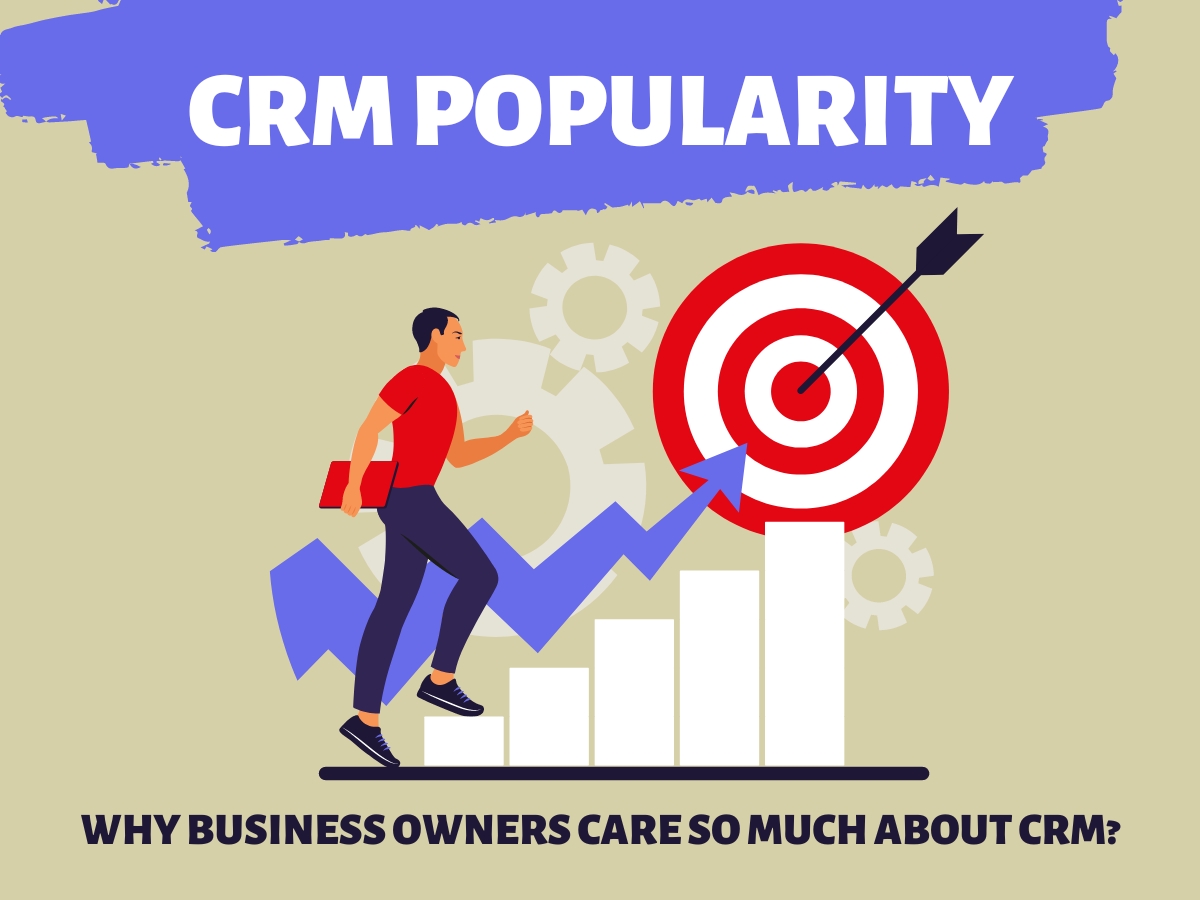CRM, or Customer Relationship Management, is a tool that businesses use to manage and analyze customer interactions and data throughout the customer lifecycle. The purpose of CRM is to improve customer relationships, increase customer loyalty, and drive sales growth.
By using a CRM system, businesses can keep track of customer interactions, preferences, and history in a single, centralized database. This can help businesses to better understand their customers, identify sales and marketing opportunities, and provide more personalized customer service.
From providing meaningful metrics to perhaps a misleading amount of popularity, Here are nine reasons why CRM software is becoming so popular among small businesses:
Breaks Down Data into Meaningful Metrics
Customer Relationship Management software is growing more and more popular among smaller businesses because it not only collects data like there’s no tomorrow but also offers detailed analytics tools. As a small businessperson, you want all the data possible and then you want to use it well. Any CRM program worth its salt will break down all that accumulated data into understandable metrics that help you move forward.
Natalia Brzezinska, Marketing & Outreach Manager, UK Passport Photo
Boosts Productivity
CRM software is a brilliant solution to streamline processes for leads and customers. Small businesses don’t have the time to manually search for prospects, leads, and customer information, and they don’t have the budget to hire someone to specialize in that.
CRM software is powerful because it can hold all your information in one place. It keeps your small business organized so you don’t have to search through mounds of paperwork or spreadsheets. Not only that, some CRM software can send data to other software programs and modules, streamlining your business even more.
Small businesses may be worried about the dollar sign, but streamlining their leads and customer information will give them more time to close sales and increase profitability without having to hire another full-time employee.
Aerin Ogden, Digital Marketing Manager, QFloors
More Accessible
As a small business owner myself, I used to think of CRM as something that only larger enterprises could afford. But a surge in new CRM software has made these solutions more affordable and user-friendly for smaller teams with small budgets.
Enterprise-grade CRM is overkill for my business; I don’t need tons of automation and all the bells and whistles. With so many CRM options to choose from, I’ve found one I like that’s affordable, easy to use, and gives me the features I want without having to pay for stuff I don’t need.
CRMs have become more customizable and less costly, and many CRM solutions offer third-party integrations with other apps that small businesses are using, making it easy to create one seamless system.
Alli Hill, Founder & Director, Fleurish Freelance
Allows for Marketing DIY
CRM is great because of how versatile it is. Small businesses can do much with a CRM, such as sending abandoned cart reminders, marketing emails, or SMS alerts.
Most CRMs aren’t complicated to learn, and once you’ve set them up properly, there is very little maintenance. A small business owner may take a few weeks to set it up, but then you can let the CRM run automatically. You’ll have to adjust it from time to time and make sure it’s up to your standards of performance, but a CRM can do a lot of tasks that you may hire someone in marketing for. It just makes sense for a small business to have a CRM instead of hiring someone.
Seth Newman, Director, Sporting Smiles
Improves Customer Interaction
One reason CRM software is becoming so popular among small businesses is its ability to streamline customer interactions and automate customer follow-ups. Small businesses can save time and effort by automating customer follow-ups with CRMs while providing a personalized experience to their customers.
Additionally, CRM software helps small businesses to easily segment their customers into lists, track customer activity, and analyze customer data to gain valuable insights. These insights can then help make informed decisions and ensure that customers get the best possible experience.
Tiffany Homan, COO, Texas Divorce Laws
Saves Time and Increases Efficiency
At some point, small businesses outgrow pen and paper or a plain spreadsheet. A CRM allows interconnection between emails, calls, sales, and other touchpoints, allowing for a more comprehensive view of the customer at the touch of a button.
It also allows for more insights into the sales process. When a small business can see that they have yet to contact a customer for too long or that they have over-contacted a prospect with the same message, they can refine what they say, when, and how.
These can all be leveraged to increase sales, but only if we input correct and timely information into the system. Another way a CRM helps is that it allows for more people to be involved. It allows the founder/owner to outsource or employ others to take over some aspects of customer and prospect care.
Leanne Dow-Weimer, Podcast Host, Markigy LLC
Centralizes Your Database
Businesses can effectively nurture relationships with their clients and consumers with the help of CRM software. There are many reasons for choosing CRM software, but a centralized database is something that has made the software more popular among small businesses.
You can see exactly what product your customer is interested in with their previous buying information mentioned in the software and won’t have to use different software to maintain information related to business and customers.
You get all the information in one place, which saves time that you can use to improve services. Struggling to collect information to analyze customers and update products/services can take up a lot of time. Since small businesses can’t afford to waste time and money using different sources, CRM software is the best option.
Sanjay Singh, Founder & CEO, Technource Inc.
Helps With Customer Profiling
Today, it is necessary to build up customer profiles to improve relationships with clients. Some CRM software programs start by saving external data which you can use for marketing goals, which will be necessary when third-party cookies end by the summer of 2023. We use Capterra to find the best CRM tools and specs.
Rick Burgers, MD, Happy Horizon
Popularity May Be Misleading
Small businesses are buying CRMs because they believe it’s the key to higher sales, but too often it’s only the key to huge time-wasting. Small businesses want to stay in touch with their customers, and that’s great! But most customers don’t want another mass email in their spam box, and that’s as much as most small businesses figure out how to do with their CRM.
Do you know what top customers want? A deeper connection with the companies they choose to support.
I wish small businesses wasted less effort on CRMs and invested more into connecting personally with the top 10% of their customers. Ten percent of a small business’s customers want to spend 10 times more money with them, but too many small businesses are wasting effort trying to broadcast to everyone instead of going deeper with their top customers.
Ben Lawrence, Founder, Wolf Heart Sales
Conclusion
In conclusion, CRM is growing in popularity among business owners because it helps them to better understand and manage their customer relationships. By centralizing customer data and interactions in a single, easily accessible database, businesses can improve their customer service, identify sales and marketing opportunities, and increase customer loyalty.
Additionally, CRM helps businesses to streamline their sales and marketing processes, allowing them to work more efficiently and effectively. With these benefits, it’s no surprise that CRM is becoming increasingly popular among business owners looking to grow and improve their customer relationships.
- Generative AI is Being Used For Fraud! What Now? - February 18, 2024
- ESG Is Losing Ground, Sustainability Is The New ESG! - January 25, 2024
- Team Building with Workplace Bonding Ideas: Fostering Unity and Productivity - October 9, 2023

